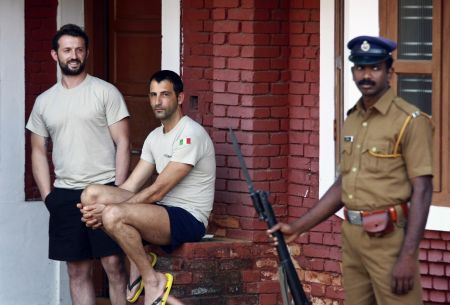 The Ministry of Home Affairs feels that awarding death penalty to the duo will sour ties with Italy, reports Vicky Nanjappa.
The Ministry of Home Affairs feels that awarding death penalty to the duo will sour ties with Italy, reports Vicky Nanjappa.
The case of the Italian marines who have been charged with the killing of two Indian fishermen off the coast of Kerala is expected to turn into a damp squib. Even as the Italian government approached the Supreme Court against the invocation of the Suppression of Unlawful Acts Against Safety of Maritime Navigation Act -- which attracts the death penalty -- they may get indirect support from the government of India which is opposed to the idea of such harsh laws.
Although the National Investigation Agency, which is probing the case, had planned on seeking death penalty for Italian marines Massimiliano Latorre and Salvatore Girone under the SUA, the final decision will lie with the ministry of home affairs which has to accord sanction.
The question of sanction comes into play since the NIA has chosen to prosecute the Italian Marines under Section 3 of the SUA. The section provides a clear option for the agency to seek a death penalty and the law is so stringent that courts most of the times accept the version of the prosecution.
However, the MHA feels that this may just blow things out of proportion and hence has told the NIA to go slow on the case.
Seeking a death penalty would be too harsh and could lead to souring of ties with Italy, and hence the MHA wants the NIA to try the marines for murder under the Indian Penal Code.
The Indian Penal Code Section 302 deals with murder and there is an option of handing over a life sentence in the case does not fall under the bracket of the rarest of rare cases.
However, the MHA would await the verdict of the Supreme Court before which the Italian government has challenged the invocation of SUA. The Supreme Court has been very vocal about this case in the past and has held that certain agencies do not have the jurisdiction to probe this case.
First it was the Kerala police which was told that it cannot probe this case since it was matter pertaining to international waters. The Central Bureau of Investigation was the competent authority to probe this case, but the MHA insisted that the NIA would do it.
Today there appears to be a slight problem where the NIA is concerned. The SUA does not fall under the ambit of the NIA Act and the charter of the agency clearly states that it can investigate cases only under the act.
In order to proceed any further, a sanction has to be accorded by the MHA under which the NIA falls. The NIA had filed an application for sanction two months back, but there was no action. However, now the MHA has decided that it would not accord sanction to prosecute the marines under SUA, but would want them to be tried under the weaker provisions in the Indian Penal Code.
The MHA in this case appears to have acted on the directions of the ministry for external affairs. There was a clear divide between the two ministries on this issue. Amidst growing cries for death sentence from a large quarter of people, the MEA however felt that it would hamper ties.
Moreover the MEA had also assured that the marines would be tried for murder and assured Italy that the death provision would not be used.
Although a verbal assurance is not binding on any investigation agency, it was finally decided that sanction would not be accorded for a death penalty keeping in mind the assurance given by the MEA.
The case pertains to the killing of two Indian fishermen allegedly by Latorre and Girone on board 'Enrica Lexie'.
Fearing a pirate attack, the two officers had allegedly fired at the fishermen's vessel off Kerala coast on February 15, 2012, killing two of them.
The marines were arrested on February 19, 2012.
Image: Italian Marines Salvatore Girone and Latorre Massimiliano are seen at the lawns of a CISF guest house in Kochi
Photograph: Sreeram/Reuters











 © 2025
© 2025